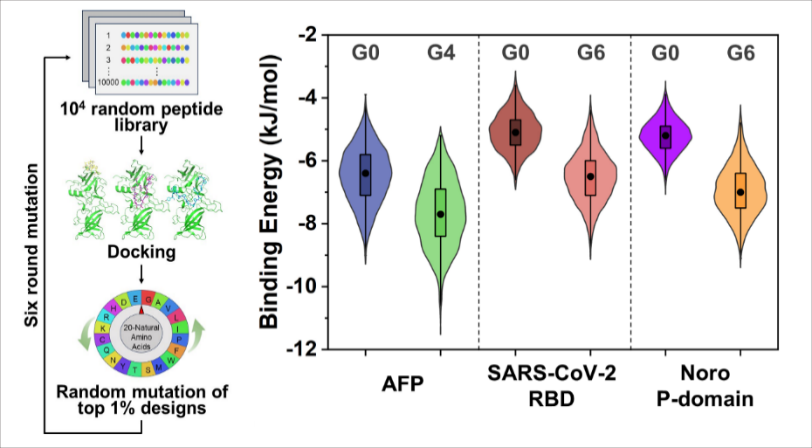The research group led by Associate Professor Xiaohong Zhou from the School of Environment, Tsinghua University has made progress in the field of virtual screening of high-affinity peptides for target protein.They proposed a novel de novo design strategy to evolve a large virtual peptide library using a directed mutation driven high-throughput virtual screening method to screen peptides with ultrahigh affinities for virous target proteins (Figure 1).

Figure 1. The framework and application of the directed mutation driven high-throughput virtual screening method
High-throughput virtual screening still faces many challenges in the process of expanding the library capacity to enhance the diversity of peptide sequences and screen high-affinity peptides. Xiaohong Zhou’s research group devised a novel de novo design strategy, constructing a generation library containing 104 random peptides, and docking with target protein through a self-developed parallel high-throughput virtual screening program. By screening and randomly mutating the top 1% of peptides, this strategy can theoretically expand the library capacity to 1014 peptide sequences, from which the strongest affinity peptides are selected. As a proof of concept, this method has been successfully applied to screen a variety of target proteins, including tumor markers (alpha-fetoprotein) and viral surface proteins (Sars-CoV-2 receptor binding domain and Norovirus P domain), and successfully identified peptides with high affinities in the nanomolar concentration range (Figure 2). The generality and scalability of the study provide economical and efficient methodological support for the rapid discovery of high-affinity peptides, especially in response to sudden pandemic outbreaks.

Figure 2. Molecular interaction between high-affinity peptides and target proteins
The paper entitled "High-affinity peptides for target protein screened in ultralarge virtual libraries" was published online in the journal ACS Central Science on November 2nd. Xiaohong Zhou is the corresponding author of the paper. PhD student Boyuan Xue from the School of Environment is the first author of the paper. All authors are affiliated with Tsinghua University. This work was supported by the National Key Research and Development Program of China and the National Natural Science Foundation of China.
Link to the paper: https://doi.org/10.1021/acscentsci.4c01385





